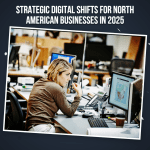Introduction: A Shift in Marketing Strategy
The landscape of modern advertising is undergoing rapid transformation. Artificial intelligence, once seen as a tool reserved for major corporations and research institutions, is now directly influencing how small and medium-sized businesses engage with their customers. A recent example in Los Angeles has captured attention across North America: a family-run tamale shop used AI tools, including ChatGPT, to script and voice a 46-second video in less than ten minutes. The result was a viral advertisement that reached over 22 million views on Instagram, significantly increasing foot traffic and brand recognition. You can watch the video here: Instagram Reel.
This event illustrates a broader theme that demands attention: artificial intelligence is reshaping Digital Marketing strategies for businesses of all sizes. The case of this tamale shop underscores how accessible technology can create measurable impact in customer acquisition, brand awareness, and consumer engagement.
The Campaign: From Concept to Viral Reach
The campaign’s execution was both simple and strategic. In a matter of minutes, the shop’s marketing lead generated a humorous script with ChatGPT, paired it with an AI-generated voiceover, and edited short clips of the restaurant’s food. The narrative tapped into a popular meme format, presenting a tongue-in-cheek scenario that quickly transitioned into showcasing the shop’s signature tamales.
The video’s length: 46 seconds …was optimal for modern social platforms where brevity sustains engagement. Its humor, relatability, and timely alignment with online trends allowed it to gain traction rapidly. What began as an inexpensive experiment in digital creativity evolved into a powerful advertising success story.
For small businesses in Canada and the United States, this example demonstrates that effective campaigns do not necessarily require significant budgets. Instead, they rely on creativity, speed, and the strategic use of AI-enabled tools.
Artificial Intelligence as a Catalyst for Consumer Engagement
The viral success of this tamale shop highlights a pivotal development in the evolution of marketing: artificial intelligence is no longer supplemental, it is central. AI tools are now facilitating scriptwriting, voice generation, video editing, and audience analysis, allowing businesses to move quickly from ideation to execution.
By using AI, the tamale shop achieved several outcomes that reflect broader strategic opportunities:
- Efficiency: The entire advertisement was conceptualized and completed in minutes, bypassing traditional creative cycles that can take days or weeks.
- Scalability: With AI-generated content, businesses can replicate and adapt campaigns across multiple platforms and markets with minimal additional cost.
- Relevance: AI’s ability to mirror popular cultural trends ensures that content resonates with audiences at the precise moment when interest is highest.
- Engagement: The video’s humor and concise storytelling encouraged sharing, commentary, and direct consumer response, driving both online visibility and in-store visits.
For SMEs across North America, these advantages can translate into stronger brand positioning and higher returns on marketing investments.
Implications for Small and Medium Businesses
The tamale shop’s achievement is more than a local success story; it offers strategic lessons for small and medium enterprises across Canada and the United States.
1. The Democratization of Advertising Tools
Historically, the creation of effective advertisements required professional agencies, large production teams, and substantial budgets. Today, AI has dramatically lowered these barriers. The same tools used by the tamale shop are available to independent retailers, local restaurants, and service providers. The accessibility of AI represents a democratization of marketing power, ensuring that smaller firms can compete on visibility with much larger competitors.
2. Agility as a Competitive Advantage
Speed is now a critical factor in advertising success. In a marketplace defined by rapid cultural shifts, businesses that can respond to trends quickly are more likely to capture attention. The tamale shop capitalized on a timely meme, and their ability to produce content in minutes rather than weeks positioned them at the center of online conversation. SMEs that adopt similar practices can use agility as a strategic differentiator.
3. Authenticity in AI-Enabled Marketing
While AI generated the structure and narration, the tamale shop’s authenticity anchored the campaign. The humor reflected the personality of the family behind the business, and the visuals highlighted real food and genuine service. Consumers are increasingly discerning, and authenticity remains the deciding factor in whether AI-driven content resonates. Businesses must ensure that technology enhances, rather than replaces, their unique identity.
4. Strategic Risk and Reward
Viral success often comes with challenges. A sudden influx of attention can strain operations, from increased demand to heightened customer expectations. Businesses must plan strategically for these outcomes. The tamale shop benefited from increased traffic, but future campaigns must consider supply chain management, staffing, and scalability to ensure sustainability.
Building a Replicable Framework
The success of the tamale shop provides a framework that other businesses can adapt. Key elements include:
- Trend Identification: Monitoring social media platforms to identify relevant formats or topics that align with brand identity.
- Content Creation: Using AI to generate scripts, edit content, and create voiceovers quickly and effectively.
- Authenticity Checks: Reviewing AI output to ensure alignment with the brand’s values and voice.
- Rapid Deployment: Publishing content promptly to capitalize on cultural relevance.
- Engagement Metrics: Measuring outcomes not only in views and likes but in actual conversions, such as increased sales or inquiries.
By following these steps, SMEs can integrate AI into their ongoing marketing strategies with measurable results.
The Future of AI in Marketing
The tamale shop’s experience is a precursor to a larger transformation. As artificial intelligence tools become more advanced, their role in marketing will expand. Predictive analytics, customer behavior modeling, and automated personalization are already emerging as the next frontiers.
For Canadian and American SMEs, this evolution presents both opportunities and responsibilities. On one hand, AI will provide unprecedented precision in targeting, messaging, and engagement. On the other, businesses must maintain ethical standards, ensuring transparency, protecting consumer data, and preserving authenticity.
The competitive environment will increasingly reward those who adopt AI strategically while penalizing those who delay adaptation. In this context, the tamale shop’s viral advertisement is not simply a success story but an early indicator of how the marketing landscape will evolve in the coming decade.
Conclusion: A Turning Point for Consumer Engagement
The case of the Los Angeles tamale shop represents a significant turning point in how businesses approach consumer engagement. Artificial intelligence has moved from the margins to the center of modern marketing, empowering even the smallest enterprises to achieve global reach.
For small and medium businesses in Canada and the United States, the lesson is clear: innovation is no longer optional. AI provides the tools, but success depends on how those tools are applied. Creativity, agility, and authenticity remain essential, yet the scale and speed of delivery are now defined by artificial intelligence.
The viral advertisement is more than a story of one family-run restaurant. It is a case study in the future of marketing, illustrating how AI can redefine the relationship between businesses and consumers. As adoption accelerates, businesses that integrate AI into their strategies will not only survive in a competitive environment but thrive in it.









